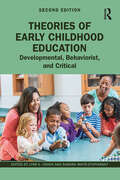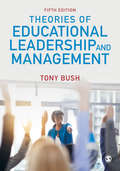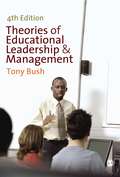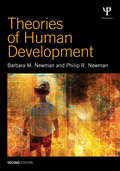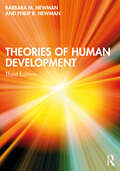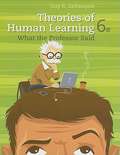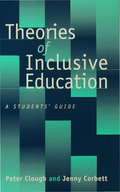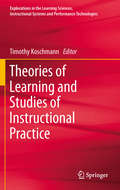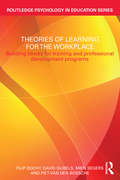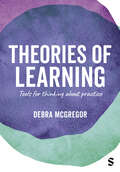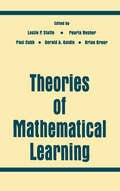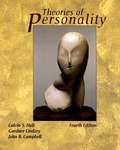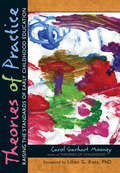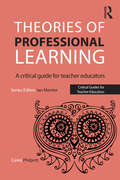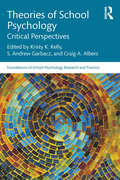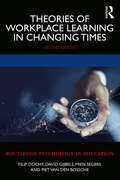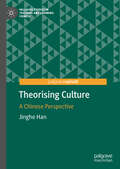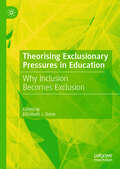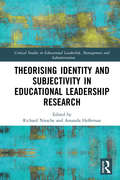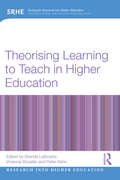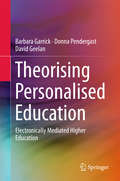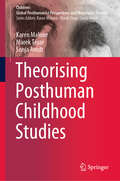- Table View
- List View
Theories of Early Childhood Education: Developmental, Behaviorist, and Critical
by Lynn E. Cohen Sandra Waite-StupianskyTheories of Early Childhood Education continues to provide a comprehensive overview of the various theoretical perspectives in early childhood education from developmental psychology to critical studies, Piaget to Freire. This revised and updated edition includes additional chapters on Michael Alexander Halliday’s view of language learning and the attachment theory work of John Bowlby and Mary Ainsworth. Each author questions assumptions underpinning the use of theory in early childhood education and explores the implications of these questions for policy and practice. Theories reported in this book are a timely reminder of the importance of the relationship between theory and practice necessary for teacher candidates, teacher educators, and early childhood teachers. Students will learn the fundamentals while in-service teachers and professionals will learn the theory behind field observations for their certification exams.
Theories of Educational Leadership and Management
by Tony BushThis fifth edition of Tony Bush&’s bestselling text explores the links between educational management theories and the main models of leadership, and their application to policy and practice globally across varied educational contexts. This fully updated new edition is informed by an enhanced global perspective and expanded coverage of important contemporary issues including teacher leadership, professional learning communities, transformational leadership, instructional leadership and a critical assessment of distributed leadership. This is essential reading for all teachers who aspire to management, as well as for experienced leaders on Masters&’ level courses, and for those studying school management as part of education degrees.
Theories of Educational Leadership and Management
by Tony BushThis fifth edition of Tony Bush&’s bestselling text explores the links between educational management theories and the main models of leadership, and their application to policy and practice globally across varied educational contexts. This fully updated new edition is informed by an enhanced global perspective and expanded coverage of important contemporary issues including teacher leadership, professional learning communities, transformational leadership, instructional leadership and a critical assessment of distributed leadership. This is essential reading for all teachers who aspire to management, as well as for experienced leaders on Masters&’ level courses, and for those studying school management as part of education degrees.
Theories of Educational Leadership and Management (Administration And Leadership Ser.)
by Tony BushThis text is for teachers, educational leaders in Master's courses, and those working toward degrees in education studies. The first two chapters define educational management and educational leadership and introduce six management models and 10 leadership models. In each of the next six chapters, the heart of the book, a major model of educational management is described and analyzed in terms of assumptions made about goals of educational institutions, the nature of organizational structure, the most appropriate modes of leadership, and links to leadership models. Coverage encompasses formal, collegial, political, subjective, ambiguity, and cultural models. This fourth edition includes new case studies from many different types of educational settings, from early years through higher education, and in international settings. New learning features include in-text definitions, summaries, and discussion questions. Bush teaches educational leadership at the University of Warwick. Annotation ©2012 Book News, Inc. , Portland, OR (booknews. com)
Theories of Human Development
by Barbara M. Newman Philip R. NewmanKey human development theories that continue to guide research and practice are examined in this engaging text. Ten key theories are grouped into three families - those that emphasize biological systems, environmental factors, and those that reflect an interaction between the two. This organization enhances students' ability to evaluate, compare, and contrast theories both within and across families. Each family is introduced with an overview of their unique perspectives and the rationale for grouping them together. Discussion of each theory includes the cultural/historical context during the theory's development, its key concepts and ideas, extensions of the theory in contemporary work, an example showing a modification of the theory, an application of how the theory is used to inform practice, and an analysis of how the theory answers 6 basic questions that a human development theory should address. Each chapter includes an overview of the strengths and weaknesses of the theories to facilitate comparisons. Theories that have a clear lifespan focus along with cases and examples that address issues across the lifespan are included The second edition features: -A new chapter on bioecological theory that highlights the increased use of this theory in the development of family, school, and community intervention programs. -A new epilogue that examines the same case via each of the ten theories illustrating their similarities and differences and how these ideas cast a unique light on a common situation. -New opening cases that bring theory to life along with narrative that links the case to the chapter's concepts, guiding questions that help students compare theoretical perspectives, critical thinking questions that focus on using the theory to interpret the case and personal life experiences, and recommended resources that extend students' understanding. -More examples from various disciplines that address topics students are likely to encounter as professionals. -A new glossary that defines the boldfaced key terms. -Enhanced website at www.psypress.com/9781848726673 that provides instructors with a test bank, Power points, discussion questions and activities, additional cases with questions, teaching notes for using the book with various types of majors, and a conversion guide outlining changes to the new edition and students with key terms with hot links to their definitions, chapter summaries and outlines, and additional resources for further study. -Updated research and applications highlight the latest scientific developments. Ideal for advanced undergraduate or beginning graduate courses in theories of development, lifespan or child development taught in psychology, human development, family studies, education, and social work.
Theories of Human Development
by Barbara M. Newman Philip R. NewmanThis bestselling textbook provides an engaging introduction to 11 major theories about human development that continue to guide research, intervention, and practice. The theories are grouped into three families: those that emphasize biological systems, those that focus on environmental factors, and those that reflect the interaction between the two. This organization encourages readers to evaluate, compare, and contrast key theoretical ideas both within and across families. Pedagogical features foster critical thinking and an active approach to learning. Each family of theories is introduced with a brief overview of their unique perspectives and the rationale for grouping them together. Discussion of each theory includes the cultural/historical context within which the theory developed, key concepts and ideas, extensions of the theory in new directions, a research example, an illustration of how the theory is applied in contemporary practice, and an analysis of how the theory answers six basic questions that a theory of human development should address. Each chapter begins with a case example and related application. There is expanded visual material throughout to enhance and extend key concepts. The third edition also features: a new chapter, "Social Justice Theory," which addresses definitions of social justice, the development of social justice reasoning, emotional foundations, and behaviors related to activism, with particular focus on societal conditions of privilege and disadvantage that create social inequities and impact developmental outcomes consideration of social justice themes as they emerge across theories an increased focus on how theories account for and characterize individual differences, and the value of diversity for human adaptation a new emphasis on gender and sexual identities across theories greater attention to the role of culture as it is featured within each theory, as a component of the macro environment, and as it is internalized through socialization processes a revised epilogue, focusing on implications for family dynamics and links from theory to practice. By focusing on theories that have had a major impact on development science, this book is ideal for advanced undergraduate and graduate courses in theories of development, lifespan, or child development, taught in the fields of psychology, human development, family studies, education, and social work.
Theories of Human Learning: What the Professor Said
by Guy R. LefrancoisBoth a serious academic text and a delightful story, this book offers a clear, readable look at a full range of learning theories from behavioral to cognitive. It also covers memory, motivation, connectionism (neural net models), and social learning and concludes with a comprehensive synthesis. Its most apparent strength is its easily accessible style, but its greatest value lies in the clarity of its concepts and its emphasis on practical applications. THEORIES OF HUMAN LEARNING is narrated by a Professor. But this Professor isn't just anyone. In fact, those familiar with previous editions may conclude that he is related to Kongor and Kro, two extraterrestrials who so successfully guided students through the first two editions---or to the Old Man or, later, the Old Woman who led readers through the next editions. Wise as he is, the Professor does the job even more effectively than his predecessors in this sixth edition of THEORIES OF HUMAN LEARNING: WHAT THE PROFESSOR SAID.
Theories of Inclusive Education: A Student′s Guide
by Peter Clough Jenny Corbett`As a doctoral student, currently writing a dissertation which focuses on inclusive education, I found this an excellent supportive resource. It brings together the major theorists of the last 20 years and very importantly highlights the perceived change in Mary Warnock′s stance towards statementing since the late 1970s. This element of change in the individual, society and policy is an issue which runs through the book and from an emancipatory and postmodernist stance is a vital inclusion. The inclusion of personal reflections greatly adds to the text, instilling a confidence in the student that there is value in being a person with a point of view. For me the publication of the book comes after my own critical analysis of the literature. From a purely selfish aspect, I wish it had been published earlier in my studies. An excellent resource that I would thoroughly recommend - Amazon Review This book traces the major stages of thinking in the development of inclusive education. It provides overviews of the main theoretical influences: the medico-psychological model; sociological positions; curriculum studies; school effectiveness and the impact upon policy and practice of the Disability Movement. Positioned and discussed in their historical contexts the book provides a synopsis and critique of the last 50 years of the 20th century, including the introduction of the term ′special educational needs′, the practice of integration and the present processes of inclusive education. The unique features of this book include personal reflections by a number of people who are considered to have had a major influence in the development of Inclusive Education. Summaries of their work, their writing and their thinking are provided - drawn from interviews with them and their own publications. The book identifies and embraces some major issues. It does so bearing in mind the interests and perspectives of students working within Inclusive education studies and presents some complex issues in an accessible format with a direct style. Linking directly to the student experience, the book concludes with examples of how students have used theories on inclusive education to inform their reflections on practice. The book throughout is deliberately learner-friendly, using sample- group activities and suggested readings, and is designed to be an effective course reader.
Theories of Learning and Studies of Instructional Practice
by Timothy KoschmannThis is a book about an attempt to change the way math was taught in a particular classroom. Its title plays on our everyday usage of the terms theory and practice. In education, these terms are conventionally treated oppositionally--we have theories about what we should do and we have what teachers actually do do. In this way, theory stands prior, logically and chronologically, to practice; practice inevitably becoming theory's imperfect realization. We seek in this volume, however, to develop a different stance with regard to the relationship between the two. Taking the details of instructional practice as our principle object of study, we explore what role theories of learning might play in illuminating such practices. The book is about actual practices by which teaching is done and how contemporary theories of learning might help us understand those practices. It seeks to provide a foundation for future practice-based inquiry in education, by addressing the methodological question: How do we go about studying instructional practice in a principled way?
Theories of Learning for the Workplace: Building blocks for training and professional development programs
by Piet Van den Bossche Filip Dochy David Gijbels Mien SegersWorkplace and professional learning, lifelong learning, adult learning, learning in different contexts have become of more and more interest and now dominate all aspects of 21st century life. Learning is no longer about ‘storing and recall’ but ‘development and flow’. Theories of Learning in the Workplace offers fascinating overviews into some of the most important theories of learning and how they are practically applied to organisational or workplace learning. With each chapter co-authored by an academic researcher and an expert in business or industry, this unique book provides practical case studies combined with thorough analysis of theories and models of learning. Key figures in education, psychology and cognitive science present a comprehensive range of conceptual perspectives on learning theory, offering a wealth of new insights to support innovative research directions. Containing overviews of theories from Schön, Argyris, Senge, Engeström, Billet, Ericsson, Kolb, Boud and Mezirow, this book discusses: adult learning; workplace learning; informal learning; reflective practice; experiential learning; deliberate practice; organisational and inter-organisational expansive learning. Combining theory and practice, this book will be essential reading for all trainee and practicing educational psychologists, organisational psychologists, researchers and students in the field of lifelong learning, educational policy makers, students, researchers and teachers in vocational and higher education.
Theories of Learning: Tools for thinking about practice
by Debra McGregorTo be a successful teacher, or student of education, it is crucial to acknowledge the learning process. This book explains major learning theories, how they have developed, what beliefs and evidence they have been based upon and what they mean for teachers′ practice. Key areas considered include: How different theories, including behaviourism, constructivism, cognitivism and social culturalism, offer alternate perspectives about learning; Detailed case studies, in a range of school contexts, show how theoretical considerations play out in real situations; How a deeper understanding of learning theory can enhance your professional teacher knowledge and practice. The book also includes a range of practical tasks and questions for consideration to encourage deeper reflection about teaching and learning processes. This is essential reading for anyone training to teach in primary and secondary education, Education Studies students, and teachers seeking to refresh their knowledge and understanding of different perspectives of learning. Debra McGregor is Professor in Education at Oxford Brookes University.
Theories of Learning: Tools for thinking about practice
by Debra McGregorTo be a successful teacher, or student of education, it is crucial to acknowledge the learning process. This book explains major learning theories, how they have developed, what beliefs and evidence they have been based upon and what they mean for teachers′ practice. Key areas considered include: How different theories, including behaviourism, constructivism, cognitivism and social culturalism, offer alternate perspectives about learning; Detailed case studies, in a range of school contexts, show how theoretical considerations play out in real situations; How a deeper understanding of learning theory can enhance your professional teacher knowledge and practice. The book also includes a range of practical tasks and questions for consideration to encourage deeper reflection about teaching and learning processes. This is essential reading for anyone training to teach in primary and secondary education, Education Studies students, and teachers seeking to refresh their knowledge and understanding of different perspectives of learning. Debra McGregor is Professor in Education at Oxford Brookes University.
Theories of Mathematical Learning: Constructivist And Interactionist Theories Of Mathematical Development
by Leslie P. Steffe Paul Cobb Brian Greer Pearla Nesher Gerald A. GoldinChemists, working with only mortars and pestles, could not get very far unless they had mathematical models to explain what was happening "inside" of their elements of experience -- an example of what could be termed mathematical learning. This volume contains the proceedings of Work Group 4: Theories of Mathematics, a subgroup of the Seventh International Congress on Mathematical Education held at Université Laval in Québec. Bringing together multiple perspectives on mathematical thinking, this volume presents elaborations on principles reflecting the progress made in the field over the past 20 years and represents starting points for understanding mathematical learning today. This volume will be of importance to educational researchers, math educators, graduate students of mathematical learning, and anyone interested in the enterprise of improving mathematical learning worldwide.
Theories of Personality
by Calvin S. Hall Gardner Lindzey John B. CampbellThis is the best book on theories ever published. The fourth edition is theory-oriented and has been reorganized into four parts examing theories of psychodynamics, personality structure, growth and perceived reality, and learning. It also includes new chapters on Eysenck, Bandura, Kelly, and social learning theories.
Theories of Practice
by Carol Garhart MooneyA strong comprehension of early childhood theory is fundamental to early childhood educators' abilities to make informed decisions about the ways they support children's development and learning. In this book, Carol Garhart Mooney writes about the important task early childhood educators have to understand the foundational theories behind their daily practices. When this is accomplished, they are better able to refine their practices, create thoughtful curriculum, and do their best work with children.To this end, Garhart Mooney advocates that everyone working in early childhood--caregivers, educators, consultants, administrators--should hold degrees in early childhood. With a focus on the value that comes when early childhood educators have strong theoretical knowledge and are able to articulate why they do something for children, Theories of Practice is a call to everyone in the field to raise the standards of early childhood education. Garhart Mooney emphasizes that early childhood educators can work more confidently and effectively with children when they understand the link between best practices and the research behind them.Carol Garhart Mooney has been an early childhood professional for more than forty years and is currently the executive director at Holy Cross Early Childhood Center in Manchester, New Hampshire. She holds a bachelor's degree in elementary education and a master's degree in early childhood education. She has completed coursework for a doctorate in sociology of the family.
Theories of Professional Learning: A Critical Guide for Teacher Educators (Critical Guides for Teacher Educators)
by Carey PhilpottAn essential guide to a number of important theories of professional learning, of particular value both to those taking on new responsibilities in relation to initial teacher education (ITE) and those interested in developing new ways of working in partnership. Each chapter provides a concise and critical overview of a key theory and then considers how it might impact on the processes and organisation of teacher education, drawing on key pieces of literature throughout. The book responds to the growth of interest and research in professional and work-based learning including ideas such as communities of practice, activity theory and socio-cultural theory alongside already established models such as those of Schön, Eraut and Shulman. In addition changing models of teacher education mean there are new ways of understanding professional learning as practices, roles and identities are re-established.
Theories of School Psychology: Critical Perspectives (Foundations of School Psychology Research and Practice)
by Kristy K. Kelly, S. Andrew Garbacz and Craig A. AlbersTheories of School Psychology: Critical Perspectives describes the theories, frameworks, and conceptual models that underlie the science and practice of school psychology. Chapters provide an orientation to theories, frameworks, and conceptual models that address core school psychology domains along with application to common student, school, and system issues prevalent in the field. Promoting a deeper study of the fundamental processes and approaches in school psychology, this book advances the embedding of theories, frameworks, and models into the design and delivery of educational and psychological services for children, youth, families, and schools. Case vignettes, empirical evidence, and a broad emphasis on prevention and implementation science provide students and trainers with important information for problem-solving in research and in the field.
Theories of Workplace Learning in Changing Times (Routledge Psychology in Education)
by Filip Dochy David Gijbels Mien Segers Piet Van den BosscheThis book is an expansion and major updating of the highly successful Theories of Learning for the Workplace, first published in 2011. It offers fascinating overviews into some of the most important theories of learning and how they are practically applied to organisational or workplace learning. Each chapter is co-authored by an academic researcher and an expert in business or industry, providing practical case studies combined with a thorough analysis of theories and models of learning. Key figures in education, psychology, and cognitive science present a comprehensive range of conceptual perspectives on learning theory, offering a wealth of new insights to support innovative research directions and innovation in learning, training, and teaching for the upcoming post-Covid-19 decades. Containing overviews of theories from Argyris, Decuyper, Dochy & Segers, Engeström, Ericsson, Kolb, Lave & Wenger, Mezirow, Raes & Boon, Schön, Senge, and Van den Bossche, this book discusses: Learning of employees in the digital era Workplace learning High impact learning Informal learning Adult learning Learning & development didactics (L&D) Reflective practice Transformational learning Experiential learning Deliberate practice Communities of practice Team learning Organisational learning Expansive learning Combining theory and practice, this book will be essential reading for all trainee and practising educational psychologists, organisational psychologists, researchers, and students in the field of lifelong learning, educational policy makers, students, researchers, and teachers in vocational and higher education. It will also be of interest to those involved in training trainers and teacher training.
Theorising Culture: A Chinese Perspective (Palgrave Studies in Teaching and Learning Chinese)
by Jinghe HanThis book seeks for an alternative perspective in analysing cultural phenomena to supplement the norm of Western dominant theorising and conceptualisation. It engages notions and concepts of culture developed by Chinese cultural theorists when addressing Chinese teachers’ cross-cultural experiences in Australian school settings. This alternative approach acknowledges the fact that the generation and development of cultural theories is contextually based. Through the reciprocated theory-data examination, it enables the arguments: Chinese culture is rooted in its written language (hanzi) which makes culture inseparable from language teaching; the core of the culture is linked back to, streamlined with and continues from China’s elongated history; this core has been consistently influential on these teachers’ practices and the observable cultural shift in them could be non-genuine mimicry for survival. Document analysis witnesses the current political push for the culture’s stability and continuity through the national education system across sectors. This book provides background information for teachers with cultural backgrounds different from their students’, and draws on a bank of practice-based evidence to suggest ways to enhance teacher-student relationships in cross-cultural settings.
Theorising Exclusionary Pressures in Education: Why Inclusion Becomes Exclusion
by Elizabeth J. DoneThis book, a follow-up edition to International Perspectives on Exclusionary Pressures in Education (Palgrave Macmillan, 2023), presents an overview of inequality and inequity along different dimensions of exclusionary practices in schools and other educational settings. Contributions provide a range of theoretical perspectives which are applied to exclusionary practices and pressures in particular educational contexts, and equip readers with varied theoretical or conceptual frameworks through which contested issues around social justice and inclusive education can be acknowledged and analyzed. The book fosters a broad understanding of inclusive education by demonstrating how exclusionary pressures relating to disability, gender, socio-economic status, race and ethnicity, refugee status and sexuality work to trouble or problematize political, professional and policy rhetoric and discourses in which inclusive practices are assumed to be established. The book is of interest to researchers and students interested in intersectionality in inclusive and special education.
Theorising Identity and Subjectivity in Educational Leadership Research (Critical Studies in Educational Leadership, Management and Administration)
by Amanda Heffernan Richard NiescheTheorising Identity and Subjectivity in Educational Leadership Research brings together a range of international scholars to examine identity and subjectivities in educational leadership in new and original ways. The chapters draw on a variety of approaches in theory and method to demonstrate the important new developments in understanding identity and subjectivity beyond the traditional ways of understanding and thinking about identity in the field of educational leadership. The book highlights empirical, theoretical and conceptual research that offers new ways of thinking about the work of educational leaders. The authors take critical approaches to exploring the influences of gender, race, sexuality, class, power and discourse on the identity and subjectivity formation of educational leaders. It provides global perspectives on educational leadership research and researchers and offer exciting new approaches to theorising and researching these issues. This book will appeal to researchers, students, and professionals working in the fields of educational leadership and sociology, and the chapters within offer readers new perspectives in understanding educational leaders, their work and their identities.
Theorising Learning to Teach in Higher Education (Research into Higher Education)
by Vivienne Bozalek Brenda Leibowitz Peter KahnTheorising Learning to Teach in Higher Education provides both lecturers embarking on a career in higher education and established members of staff with the capacity to improve their teaching. The process of learning to teach, and the associated field of professional academic development for teaching, is absolutely central to higher education. Offering innovative alternatives to some of the dominant work on teaching theory, this volume explores three significant approaches in detail: critical and social realist, social practice and sociomaterial approaches, which are divided into four sections: Sociomaterialism Practice theories Critical and social realism Crossover perspectives. Readers will benefit from discussions on the role and place of theory in the process of learning to teach, whilst international case studies demonstrate the kinds of insights and recommendations that could emanate from the three approaches examined, drawing together contributions from Europe, Africa and Australasia. Both challenging and enlightening, this book argues the need for theory in order to advance scholarship in the field and achieve goals related to social justice in higher education systems across the world. It draws attention to newly emerging theoretical perspectives and relatively underused perspectives to demonstrate the need for theory in relation to learning to teach. This book will appeal to academics interested in how they come to learn to teach, to administrators and academic developers responsible for professional development strategies at universities and masters and PhD level students researching professional development in higher education.
Theorising Personalised Education
by Barbara Garrick Donna Pendergast David GeelanThis book examines the theoretical underpinning of the concept of personalised education and explores the question: What is personalised education in the contemporary higher education sector and how is it implemented? A broad, sophisticated definition of personalised learning has the potential to serve as a basis for more effective educational practices. The term 'personalised education' is, and continues to be, one with a variety of definitions. The authors' definition both incorporates earlier concepts of personalised education and critically reassesses them. The book then adds a further dimension: personalised instruction in electronically mediated environments, where the goal is to achieve learning towards mastery individually with the help of differentiated and individualised electronic learning platforms. This book assesses the various arguments concerning personalised education, examining each through the lens of educational theory and pedagogy and subsequently positing a number of qualitative characteristics of personalised education that have the potential to influence policy and practices in the higher education sector.
Theorising Play in the Early Years
by Marilyn FleerTheorising Play in the Early Years is a theoretical and empirical exploration of the concept of pedagogy and play in early childhood education. The book provides an in-depth examination of classical and contemporary theories of play, with a focus on post-developmental perspectives and Vygotskian theory. In this book, Marilyn Fleer draws on a range of cross-cultural research in order to challenge Western perspectives and to move beyond a universal view of the construct of play. Culture and context are central to the understanding of how play is valued, expressed and used as a pedagogical approach in early childhood education across the international community. Designed as a companion to the textbook Play in the Early Years, but also useful on its own, Theorising Play in the Early Years provides indispensable support to academics and TAFE lecturers in early childhood education in their course development and research.
Theorising Posthuman Childhood Studies (Children: Global Posthumanist Perspectives and Materialist Theories)
by Marek Tesar Karen Malone Sonja ArndtThis book is a genealogical foregrounding and performance of conceptions of children and their childhoods over time. We acknowledge that children’s lives are embedded in worlds both inside and outside of structured schooling or institutional settings, and that this relationality informs how we think about what it means to be a child living and experiencing childhood. The book maps the field by taking up a cross-disciplinary, genealogical niche to offer both an introduction to theoretical underpinnings of emerging theories and concepts, and to provide hands-on examples of how they might play out. This book positions children and their everyday lived childhoods in the Anthropocene and focuses on the interface of children’s being in the everyday spaces and places of contemporary communities and societies. In particular this book examines how the shift towards posthuman and new materialist perspectives continues to challenge dominant developmental, social constructivist and structuralist theoretical approaches in diverse ways, to help us to understand contemporary constructions of childhoods. It recognises that while such dominant approaches have long been shown to limit the complexity of what it means to be a child living in the contemporary world, the traditions of many Eurocentric theories have not addressed the diversity of children’s lives in the majority of countries or in the Global South.
